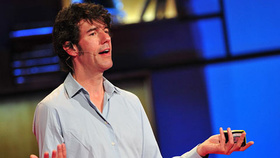Also is the knowledge that right now we spend about in the first 25 years of our lives learning,
我還有另一個原因,目前我們大概用生命的前二十五年學習,
then there is another 40 years that's really reserved for working.
之后的四十年用于工作。
And then tacked on at the end of it are about 15 years for retirement.
放到最后的是約十五年的退休生活。
And I thought it might be helpful to basically cut off five of those retirement years and intersperse them in between those working years.
我覺得更合理的可能是,拿走五年的退休時間,把它們穿插在工作的年頭里。
That's clearly enjoyable for myself.
我自己顯然因此很開心。
But probably even more important is that the work that comes out of these years flows back into the company and into society at large,
但更重要的是,是來自休假那幾年的成果可以回饋公司,回饋社會,
rather than just benefiting a grandchild or two.
而不僅是貢獻給一兩個孫子孫女。

There is a fellow TEDster who spoke two years ago, Jonathan Haidt, who defined his work into three different levels.
兩年前有一位TED的講者,名叫喬納森·海德特,他把工作定義為三個不同的層次。
And they rang very true for me. I can see my work as a job. I do it for money.
教我深深認同,我可以把工作視為一份職業。為的是錢。
I likely already look forward to the weekend on Thursdays. And I probably will need a hobby as a leveling mechanism.
星期四就開始盼周末,我可能會需要一種業余愛好來平衡生活。
In a career I'm definitely more engaged.
或者,我可以把工作看成我的事業。
But at the same time, there will be periods when I think is all that really hard work really worth my while?
這樣我會做得更加用心,但有時我又會想,花這多精力值得嗎?
While in the third one, in the calling, very much likely I would do it also if I wouldn't be financially compensated for it.
第三個層次是把工作視為一種呼召,如果工作是一種呼召,很可能我無論如何也會做,即使沒有金錢回報也沒關系。











